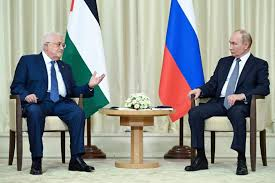Vladimir Putin: A Comprehensive Profile
Early Life and Background
Vladimir Vladimirovich Putin was born on October 7, 1952, in Leningrad (now Saint Petersburg), Russia. His early life was marked by the hardships of post-World War II Soviet Union. Putin’s father was a factory foreman and a World War II veteran, while his mother was a factory worker. The family lived in a communal apartment, which was typical for the time.
Putin’s early interests included sports, particularly judo and sambo, in which he excelled, earning a black belt in judo. His discipline in martial arts would later influence his political and leadership style. Putin graduated from Leningrad State University in 1975 with a degree in law, where he also became acquainted with Anatoly Sobchak, an influential politician who would later play a significant role in his career.
Table of Contents
Career in the KGB
After university, Putin joined the KGB, the Soviet Union’s security agency, where he served as an intelligence officer. He was stationed in Dresden, East Germany, from 1985 until 1990. His tenure in the KGB helped shape his views on power, security, and international relations. The collapse of the Berlin Wall and the subsequent dissolution of the Soviet Union deeply affected him, fostering a desire to restore Russia’s stature on the global stage.
Rise to Power
Upon returning to Russia, Putin entered politics, initially working under his former professor, Anatoly Sobchak, who was then the mayor of Leningrad. In 1996, Putin moved to Moscow and held various positions within President Boris Yeltsin’s administration. His loyalty and effectiveness quickly elevated him through the ranks, leading to his appointment as head of the Federal Security Service (FSB), the KGB’s successor, in 1998.
In 1999, Yeltsin appointed as Prime Minister. Later that year, Yeltsin unexpectedly resigned, and Putin became Acting President. He won the presidential election in 2000, leveraging his image as a strong, decisive leader capable of restoring order and stability in a country reeling from economic turmoil and political instability.

Presidential Terms and Policies
First Two Terms (2000-2008): Putin’s initial presidency focused on consolidating power and stabilizing Russia. He implemented economic reforms that led to significant growth, driven by rising oil prices. Domestically, Putin centralized power, curbing the influence of oligarchs and regional governors, and reasserted control over key industries, especially in energy.
Putin also launched a brutal military campaign in Chechnya to quell separatist movements, which, while controversial, effectively brought the region under Moscow’s control. His government faced criticism for human rights abuses and the erosion of democratic institutions, including the suppression of free press and political opposition.
Prime Minister (2008-2012): Constitutionally barred from serving more than two consecutive terms, Putin appointed Dmitry Medvedev as his successor and became Prime Minister. Despite this role, many believed Putin continued to wield significant influence over Russian politics, with Medvedev seen as a loyal ally.
Return to Presidency (2012-present): Putin returned to the presidency in 2012 amidst widespread protests and allegations of electoral fraud. His third and fourth terms have been marked by increasing authoritarianism and assertive foreign policy. Domestically, he has cracked down on dissent, with prominent opposition figures like Alexei Navalny facing imprisonment or exile.
Foreign Policy and International Relations
Putin’s foreign policy has been characterized by a desire to reassert Russia’s influence on the global stage. Key aspects include:
- Annexation of Crimea (2014): The annexation of Crimea from Ukraine marked a significant escalation in Putin’s aggressive foreign policy. The move was condemned internationally and led to sanctions from Western countries, but it bolstered Putin’s domestic popularity by appealing to nationalist sentiments.
- Intervention in Syria (2015): Russia’s military intervention in the Syrian Civil War aimed to support President Bashar al-Assad, a key ally, and reestablish Russia as a major player in the Middle East. The intervention also served to counter U.S. influence in the region.
- Cyber and Information Warfare: Putin’s administration has been accused of engaging in cyber warfare and disinformation campaigns to influence elections and destabilize Western democracies. The most notable instance is the alleged interference in the 2016 U.S. presidential election.
- Relations with China: Under , Russia has strengthened ties with China, forming a strategic partnership based on mutual interests in counterbalancing U.S. influence, economic cooperation, and military collaboration.
Domestic Policies and Economic Challenges
Putin’s economic policies have focused on maintaining stability and leveraging Russia’s vast natural resources. High oil and gas prices in the early 2000s led to significant economic growth. However, the economy remains heavily dependent on energy exports, making it vulnerable to global price fluctuations.
In recent years, economic sanctions, low oil prices, and internal corruption have stifled growth. Despite these challenges, Putin has maintained high approval ratings, partly due to his control over media and political narrative.
Personal Life and Public Image
Putin’s personal life is shrouded in secrecy. He married Lyudmila Shkrebneva in 1983, and they have two daughters, Maria and Katerina. The couple divorced in 2013. image is carefully managed, portraying him as a rugged, action-oriented leader. Public displays of physical prowess, such as practicing judo, riding horses shirtless, and piloting aircraft, reinforce his persona as a dynamic and invincible leader.
https://indianfastearning.com/
Legacy and Future Prospects
Vladimir Putin’s legacy is complex and polarizing. Supporters credit him with restoring stability, reviving the economy, and reasserting Russia’s global influence. Critics argue that his tenure has been marked by authoritarianism, human rights abuses, and economic stagnation.
In 2020, constitutional amendments were passed that could allow to remain in power until 2036, potentially extending his rule to over three decades. This move has raised concerns about the future of democracy in Russia and the prospects for political reform.
As Russia faces ongoing economic challenges, international isolation, and internal dissent, the future under Putin remains uncertain. His ability to navigate these issues will significantly impact Russia’s trajectory and his own place in history.







